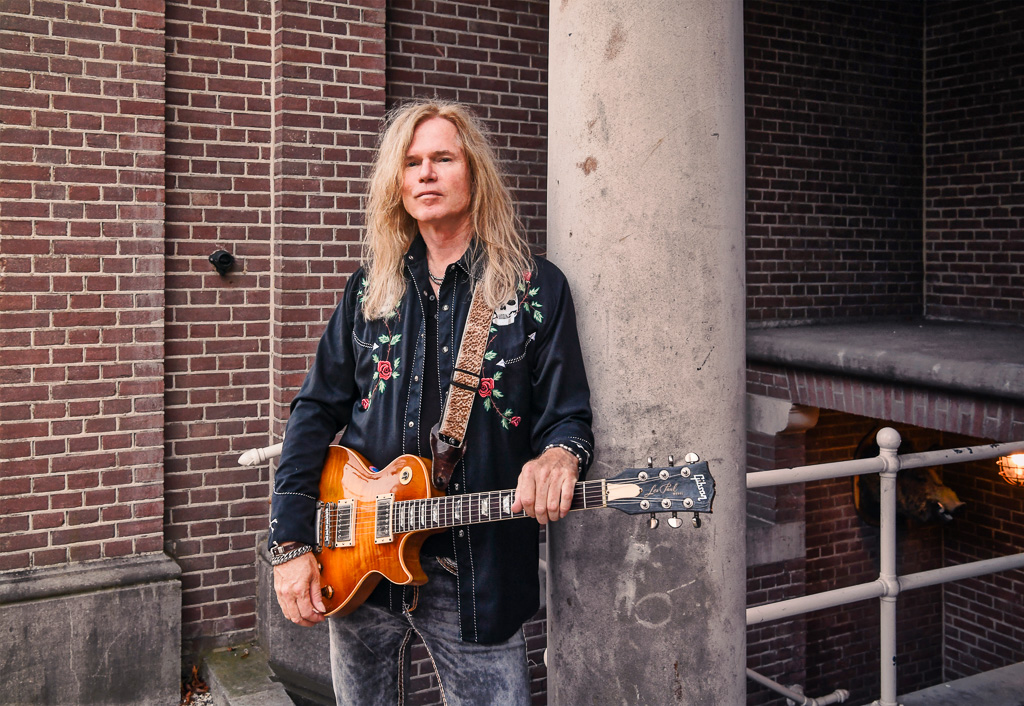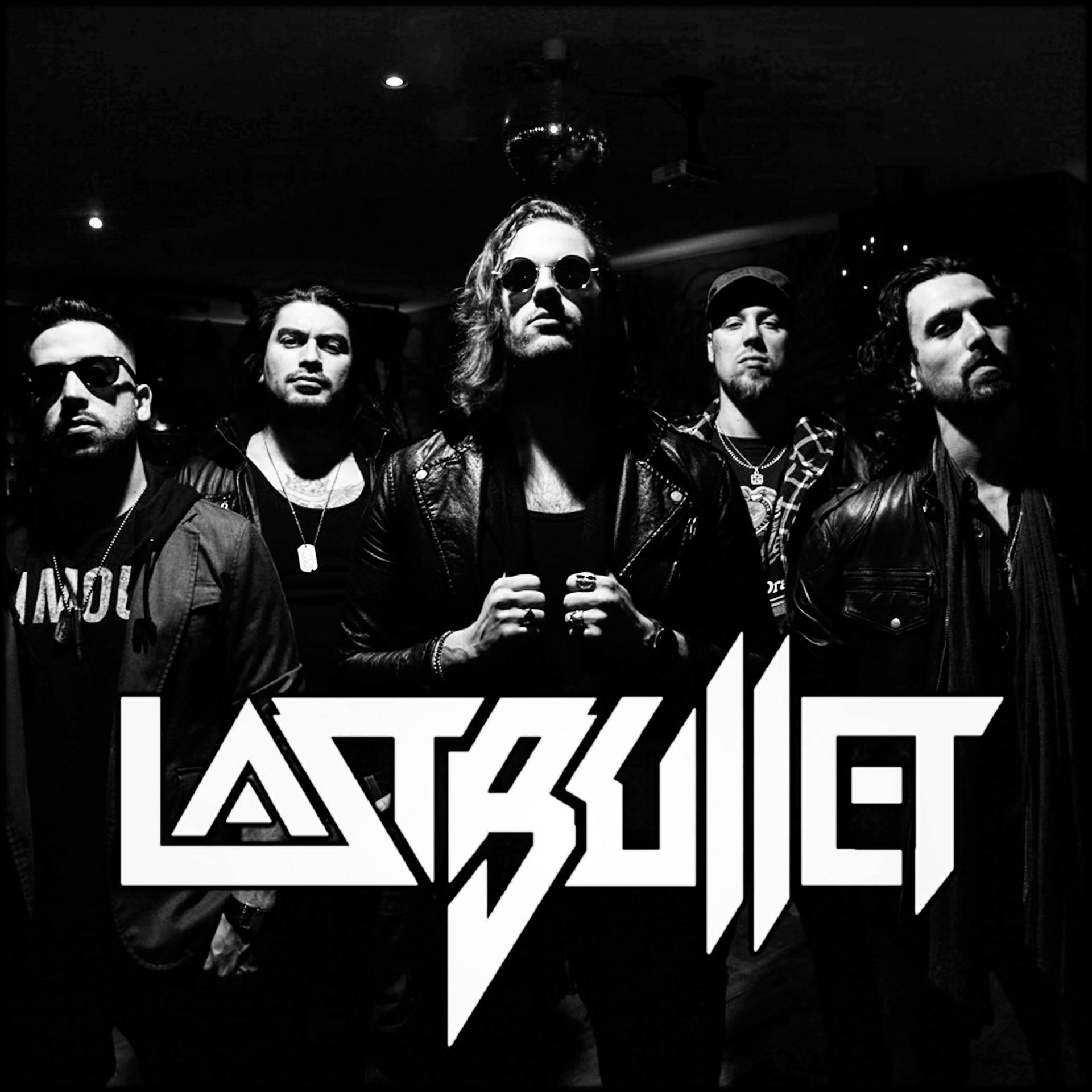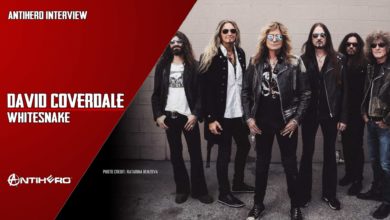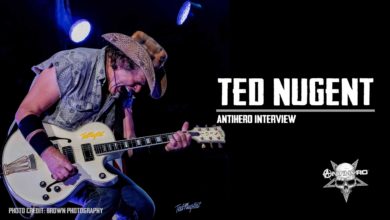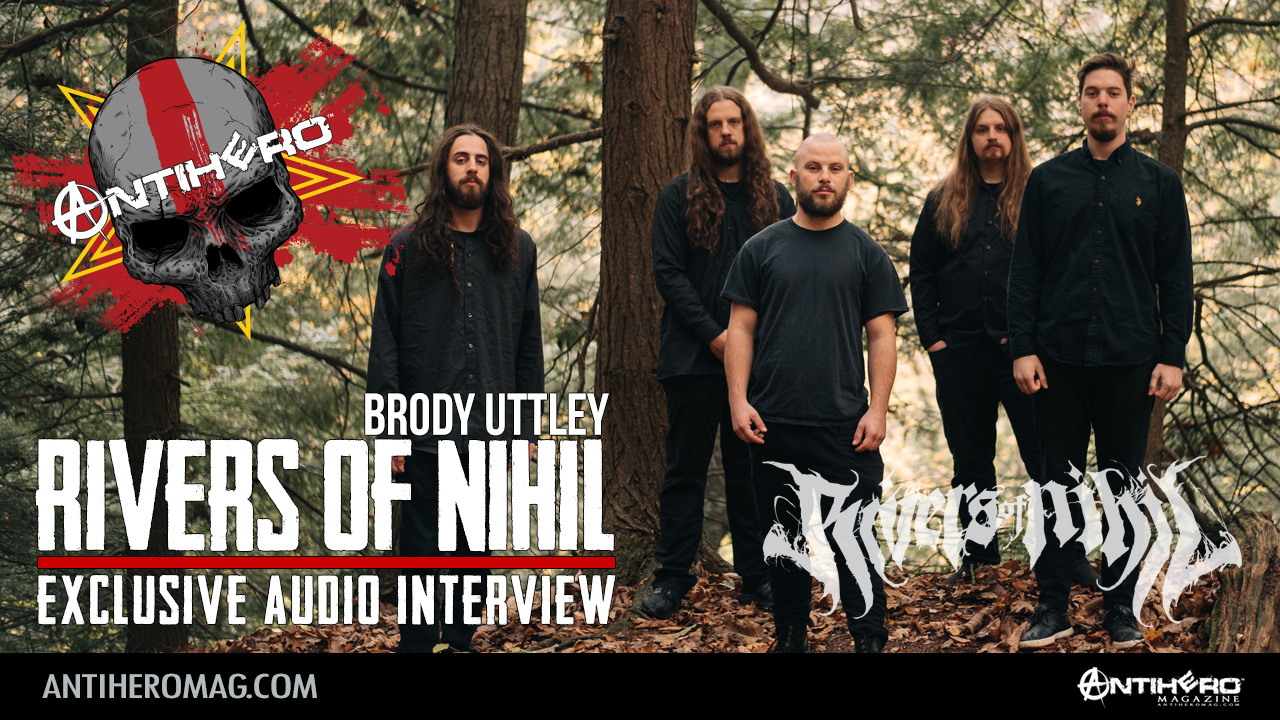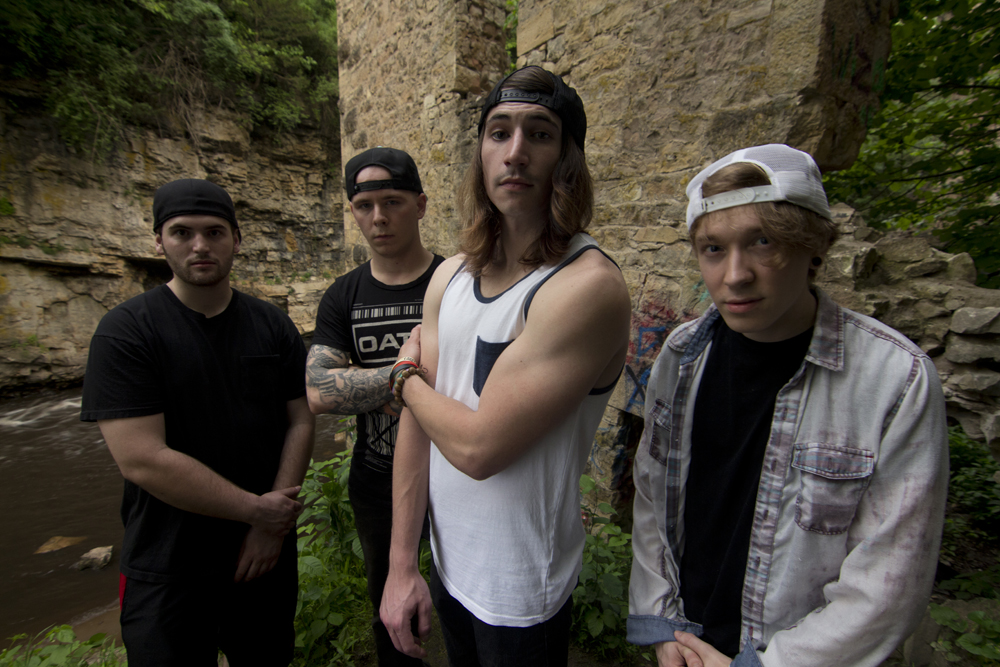A Conversation with Adrian Vandenberg of Vandenberg’s MoonKings
Four years after Adrian Vandenberg made a spectacular comeback with Vandenberg’s Moonkings the band returns with a sophomore album, simply titled MK II. The album has all the qualities of the debut: once again the four-piece band manages to create a perfect mix of vintage seventies hard rock and current styles of heavy rock. Adrian Vandenberg shines as a bonafide guitar virtuoso, while the rest of the band also delivers in spades. Yet MK II has even more to offer than the highly praised first album. It shows how the band grew into a strong unit during the world tours of the recent years.

ANTIHERO: Last time I spoke to you was just after the release of the first MoonKings album. I just wondered how the band has developed both creatively and personally since then?
Adrian Vandenberg: Well, I couldn’t have wished for better actually, because first of all, I knew we were on the right track when I put this band together and the chemistry between all four of us, both on a personal level plus on the music level, was like a textbook situation basically. And it only got stronger especially musically because with the first album we’ve never done a show together and then after the release of the first album we toured quite a lot and with a whole bunch of shows of course, and so we grew even tighter as a unit which is really a blessing as a player because we can learn from each other. As you know the bass player and the drummer are from a younger generation. The drummer, when he joined my band he was 21; right now, he’s 25 and the bass player is 28. And a lot of people go, “oh, that’s very young”, but then again, if you think back to the days of Zeppelin and the Free and Cream and stuff, those guys were 21/22. So, when you’re around that age, if you haven’t developed into a great musician yet, I don’t think it’s going to happen again – I don’t think it’s going to happen anymore. So, with these guys I always believed, and you can see that in history of music, in classical orchestras and jazz bands and stuff it’s been always the case that there can be like guys that are 22 and other people who are 84. When you connect on a musical level then it’s all good and on a personal level like I said we spend a lot of time together in the bus or in the car or whatever and we just have a blast; it’s really, really amazing.
ANTIHERO: The first album you were finding your feet musically, and personally as you indicate, but this is a more accurate representation of how you want to sound. Do you feel also that particularly in the second album?
Adrian Vandenberg: Yeah, definitely, and with the help of a lot of choruses. Well, the first album I must say, it’s still one of my favourite albums because of its freshness and I was really happy and still happy with the songs and everything. It’s logical if you are a band that’s based on musical plus personal chemistry that you’re going to grow as a unit and I really feel we have done that, and also as a producer I wanted this album to sound even closer to how we sound live. So, with the first album as far as the guitar sound goes, I went all the way back to basic and recorded most of the guitar parts on small amplifiers and stuff which I rarely play; I’m a Marshall kind of guy. So, with this album I went back to my Plexi Marshalls and for the drums we got closer to how it might sound live. So basically, I wanted this album to sound like you’re in a nice sized club and you’re in a sweet spot as far as the sound mix goes and if you put on the headphones then I wanted it to sound like you’re with the band; you can hear every little detail and every little drum or bass or guitar subtlety and the same goes for the vocals. So, I do still listen, even though I’ve heard this record a million times by now, but I do still listen to it on headphones for my own enjoyment or in the car or something and I’m just really, really happy with.
ANTIHERO: I was going to ask you about that. I was going to ask you if there was a different recording process, a different producer on this one, because that’s something that definitely came through to me that there was a different sound to this compared to the first one. To me it seemed sort of fresher and crisper.
Adrian Vandenberg: Yeah, I’m glad you think so because that’s what we tried to aim for. It’s always an adventure when you go into the studio because it’s almost like a photo that you take, it’s like a moment captured in time and you’re going to have to live with it for the rest of your life as a musician. I still play records that I bought as a teenager in the early 70s, so that’s another thing. I like to make a record that I would go out and buy, and I try to achieve to make it sound like you would like to hear a band sound where you can hear everything, where there’s like breathing spaces in between, not everything is kind of filled with layers and layers of guitars and keyboards and background vocals. In this case what you hear is what you’re going to get, and we can easily achieve this live with the exception of the two songs where an orchestra was brought in with 15 violin players because it fit the songs, and we’re going to see how we show the thing live. Because with the first album on a song like “Breathing” we had the same thing and we played the song live and it works just as well. Because in the end that’s what’s the thing about a song; a good song should be able to stand on its own whether you play it acoustically or whether you play it with or without an orchestra or with 25,000 Bulgarian female background singers; it should go either way. Like you could actually undress a song to produce one acoustic guitar and one vocal and it should still stand up.
ANTIHERO: Something like you did actually with the song “Sailing Ships”, for example?
Adrian Vandenberg: Yeah, exactly. It was just a blast on the first album to record a song with David because as you probably know, I couldn’t record it at the time because of my injury on my wrist, so it was really nice to do that again. Of course, I wanted it to be very different from the one on the Slip of the Tongue album because otherwise it doesn’t make any sense to re-record it.
ANTIHERO: It’s just like you say, a good song…
Adrian Vandenberg: It has to be in between the Starkers in Tokyo version and in between the studio version.
ANTIHERO: Do you find songwriting gets easier or more difficult as you get older?
Adrian Vandenberg: Well, easier actually because I’ve actually been writing little melodies ever since I was a kid because it comes to me very naturally. But what I like about this phase in my life, my career if you will, that in the 80s I felt a little bit constricted because of the pressure of record companies and managers and all that stuff. When I signed with Mascot Records, the boss of the company that I’m very regularly in touch with on a personal level also, he said “I followed your whole career and you’ve only made great records as far as I’m concerned, so with us you can make the records you want”. And for me I learnt after the hiatus I created for myself between Whitesnake and between MoonKings, I learnt for myself that I trust my instincts more and more partially because you want to make yourself happy with a record because I believe if you try to shoot for hit singles or go with some trends or whatever, that if it doesn’t work on a commercial level then you’re stuck with a record that you make cool sessions with. So, when I write I just let it flow, I open the gate and I put on my antenna to see if I can catch some interesting ideas out of cyber space or whatever; not cyber space, but you know. That’s how I feel, when I write a song I stick out like an antenna and I hope some inspiration gets through and usually it does and then I just follow that path because over the years I’ve learnt to trust myself with my musical instincts and then I succeed in making a record that I like myself and if you like it yourself the chance is pretty big that there’s going to be more people who like it. 
ANTIHERO: So, would you say it’s easier being your own boss even though it brings more pressure with it?
Adrian Vandenberg: Oh yeah, definitely then it’s, of course, easier. At the same time, I really enjoyed writing with David [Coverdale] and working with David, because we come from the same background on a musical level, we love the same old blues stuff and soul stuff and rock stuff. So, it was actually the only time when I ever wrote together with somebody else and it was really smooth with David; we really enjoyed it and we had a blast doing it. So, this was an interesting situation for me and right now since I write the lyrics again like I’ve always done, that comes easy to me as well. When I’m working on a piece of music for some reason words or sentences kind of get through the same antenna where my wrist and my melodies come from. So, I always believe that there is a probably a reason for that, that the atmosphere of those words matches with the atmosphere of the music, so that works too for me. I feel very fortunate basically that it happened in such a way because I’ve never been in this business for the money because right now the way the business is if I would have been a dishwasher in a hotel I would have made more money than you do right now in a rock band, fighting and running against the wind. This is the reason why I’m in this business; I just love writing songs and performing live with the band with the chemistry that we have. And you can tell, with every show you can see on You Tube, every show that we do you can tell that we’re having a great time on stage and it apparently it translates through the crowd because all I see is people who are having a great time and that’s basically what you hope to achieve as a musician.
ANTIHERO: 2017 is the 30th anniversary of a certain album. I just wondered generally do you celebrate anniversaries? Do you like looking back at the past or do you prefer to look forward?
Adrian Vandenberg: I always look forward, but I love to cherish my past because it was really a great time with Whitesnake. Somebody actually put it to my attention that the first Vandenberg album is 30 years ago today. No actually 35, sorry it was 1982. I didn’t realize it but when you think about it, I do think a lot about… I do cherish my past with Whitesnake because it was obviously a fantastic period where as a Dutch guitar player from the middle of nowhere you get to tour worldwide, play stadiums and see happy people and see girls flash their boobs. That’s typically United States. But it was just a blast and then we had a great time together and the first line up with Rudy and Tommy and David and Vivien it was just an amazing time. And at the same time, I’m not one to live in the past, I always live in the moment and look towards the future to try to create great memories in the future as well. It keeps me going and it keeps me very energetic as you can probably tell. I must have done about 70 interviews in the last couple of weeks and I’m still really energetic talking about what we do, and I hope we can play everywhere as much as we can and we’re definitely going to come back to Britain and play much more shows than just the one in London. It was just that we could fit one show in our schedule in such an early phase because otherwise it would have taken a longer time to play Britain and I didn’t want that because we really missed the momentum last time when we were only able to do three shows in England, which is ridiculous. I want to play everywhere in Britain and hopefully we’ll get a chance to do it this time.
ANTIHERO: If I could just take you back. You mentioned there the 1987 album. How did it impact on you as a person? I mean you had huge massive levels of success, you were being recognized everywhere, you were on MTV, did that have an effect on you? I mean was it difficult to deal with?
Adrian Vandenberg: No, for me it was pretty easy. The Dutch, just like the English, are very down to earth usually. My parents always raised my sister, brother and me as just “count your blessings, be happy with what you’ve got, and just keep your feet in the mud” basically, and that’s what I did. In those days whenever I had some time off that was longer than a week I flew back to Holland to hang with my friends, to grab a few beers here and there, to see my family and my dad and my mum and my sister and brother and that kicks you down to earth. I never got sucked into this Hollywood lifestyle in the 80s where all the band guys from other bands were cruising around in Ferraris and shit. I was driving a really old Citroen in Holland; that old French car that looks like a UFO. When I’m in town or when I’m home here I’ve always just cruised around on my bicycle and I still do. I’m kind of the regular guy over here ever since I lived in this town, since my 14th. I do everything on my bicycle, even if it rains or pours I don’t give a shit and people are used to that. They see this guy with his hair down to his ass go around on his bicycle and have a beer outside on the terraces with my friends and stuff. Nothing has changed for me. The main thing that has changed is that those years gave me more artistic freedom to set up a band like this because I really have to put this thing on the rails. I do live by the moment, you never know when the bomb is going to drop and it would be such a shame if your last thoughts would be oh man I wish I would have tried this or done that or whatever. So, I’ve no regrets about anything I’ve ever done.
ANTIHERO: Of course, you’re wildly known for your playing in heavy rock music. I just wondered if there are any other musical styles or genres that you’d be very keen to develop and work in?
Adrian Vandenberg: Oh yeah, definitely. I’ve always very much enjoyed listening to gypsy music and sometimes when I do have the time I try to dig into the material a little bit because I like to keep my horizon as wide as possible. I listen to classical musical, the blues, to some kinds of jazz, the kind of jazz that I understand or try to understand. And I always think all those influences kind of come through in how I play my guitar and that probably gave me my signature style, if you want to call it that. Over the years I’ve heard that on musical schools worldwide they’re using some of my guitar stuff as a material to show to one of the guitar players and stuff and that’s like the biggest compliment that I can realize I have. Because I don’t read any notes, I have no training at all, I just fiddle around with my guitar and do the stuff that sounds good to my ears and it’s nice to hear that it sounds good to other people’s ears too and I feel very fortunate that I’m able to do this because I love my life as a musician and as a painter. I’m a lucky bastard basically.
ANTIHERO: You seem very upbeat and positive. For fans of music, fans of your work, music provides a source of comfort in times of difficulty. I just wondered when you do have those dark times where do you turn to? Would it be music, maybe your painting, your cooking, maybe something else?
Adrian Vandenberg: Definitely music, friends, good food, my daughter, my dear mum who is 94 and still as positive as ever. I feel blessed that I was raised by two very, very positive parents and it kind of seems to be in the blueprint of my genes or whatever. When I go through times like that I definitely have a lot to thank to music, whether it’s me picking up a guitar and write either a ballad or a totally uptight song, or I put on some really loud AC/DC or some really loud Led Zeppelin or whatever. That’s one of the powerful things about music and about being able to create music is that it really does positive stuff for your soul. Whether you’re depressed or whether you’re happy you can always find some kind of confirmation or consolation in music and there’s always stuff that can counter your mood a little bit or help counter your mood when times suck a little bit. Yeah, I just pretty much have to take a glass of wine or a nice pizza or whatever. The thing is with one of the things that I’ve always realized in life and that a lot of people of course know, that in the end you’ve got to make yourself happy and if you’re not happy – if you can’t make yourself happy then it’s going to be really hard to make other people happy and you can’t just blame the whole world for when you feel down. Everybody has got their shitty times and everybody’s got their own way of trying to deal with it and my way is a combination of music, friends, food, my daughter. I just get on my bicycle and cruise at top speed through the woods is something I normally do every day – I do almost every day, and whether it rains or shines or whatever I don’t care, just being outside always helps a lot too.
ANTIHERO: Okay Adrian, that’s great. I’m actually going to be attending that London show, so we still have to catch up for that Guinness that we talked about before.
Adrian Vandenberg: Yeah, I can’t tell you how much I’m looking forward to that show because it’s been way too long the last time when we played England and I heard the club is a really nice one, it’s a rock orientated club and man I can’t wait to see old happy English friends that we’ve made over the years and we’re going to do our best to make it an unforgettable evening.
ANTIHERO: As I say, thank you very much for chatting to me and hopefully we’ll get the opportunity to meet in person.
Adrian Vandenberg: Yeah, it would be great. Let me know that you’re there. It’s probably going to be a little hectic, but I hope we can find the time to at least shake hands and take a couple of sips of British beer.
ANTIHERO: Thank you very much Adrian. Have a good day!
Adrian Vandenberg: Thanks for calling. You too man, thanks, take care!

